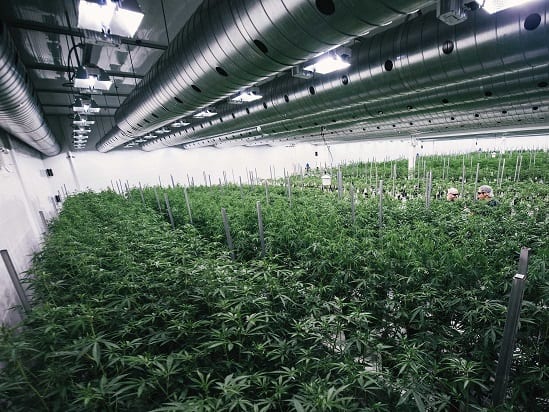Why is Canopy Growth dropping today?

Shares of Canopy Growth (Canopy Growth Stock Quote, Charts, News, Analysts, Financials TSX:WEED) tumbled on Friday after the company’s dismal-looking quarterly report. Considered one of the bellwether stocks in the Canadian cannabis space, Canopy’s long fall from grace this year has been significant as the stock is now down over 75 per cent from its highs earlier in February.
And the problem seems to go beyond the company’s lack of profitability and mounting losses, as a glut of names in the still growing but limited cannabis space has made for stiff competition for that all-important market share.
“I think a lot of why we’re seeing Canopy’s stock under pressure today is the fact that they withdrew their guidance,” said BNN Bloomberg’s cannabis reporter David George-Cosh in a Friday segment. “They initially thought that they would achieve profitability on an adjusted EBITDA basis in the second half of its current fiscal year. They’re withdrawing that.”
“Canopy does see it reaching that milestone once they can see topline revenue surpass the $225 million mark. Of course when that will happen remains to be seen. There’s a lot of bearishness right now on Canopy Growth,” he said.
Smiths Falls, Ontario-based Canopy released its second quarter fiscal 2022 financials on Friday, showing revenue down three per cent year-over-year to $131.4 million and an EBITDA loss of $50.1 million. The company’s free cash flow was a negative $101.3 million.
Pressure from competing forces in the cannabis business has been a factor, where an overabundance of supply has hampered Canopy’s progress. The company said it took an $87 million inventory write-down over the quarter related to “excess Canadian cannabis inventory resulting from lower sales relative to forecast as well as declines in expected near-term demand.”
At the same time, Canopy noted it maintained a leadership position in Canada’s premium flower category while increasing its market share in vapes and edibles over the quarter.
“The Company continues to expect revenue acceleration in the second half of FY2022 but the magnitude and pace of improvement is expected to be more modest than previously anticipated. The Company is focused on stabilizing its market share of the Canadian recreational cannabis in the second half of FY2022. Distribution expansion of BioSteel is expected to accelerate in the second half of FY2022 but shipments may depend on timing of chain authorizations and associated shelf resets,” Canopy said in a Friday press release.
On the US end of its business, where Canadian companies are in wait for the day when movement occurs at the federal level on cannabis reform, Canopy has a number of irons in the fire, including two deals to buy companies, Wana brand edibles and Acreage Holdings, both of which are dependent on moves towards legalization in the United States. Canopy also has business in the growing US CBD industry including the Biosteel brand of sports drinks.
“In new industries where the potential is immense, progress is rarely a straight line. With a focused strategy, a foundation for growth, and our burgeoning U.S. ecosystem, Canopy is uniquely positioned to win as the industry matures,” said Canopy CEO David Klein in the Friday press release.
On Canopy’s development as a company, George-Cosh said the changing pot landscape has been a factor. “I asked [Klein] how frustrated essentially are you that you have this massive amount of competition and it’s really not going away? He said, ‘Well, it’s complicated. These consumers and retailers alike, their interests in cannabis are shifting quite materially … from month to month.”
Canopy’s difficulties are sector-wide, though. Last month, another major player in Tilray (Tilray Stock Quote, Charts, News, Analysts, Financials TSX:TLRY) reported its quarterly numbers, showing a net loss of $34.6 million, up from a loss of $21.7 million a year earlier. The company had gotten bigger in a couple of ways recently through the merger with Aprhia and the acquisition of beverage company SweetWater, with Tilray reporting net revenue up by 43 per cent year-over-year to $168 million. Tilray’s shares are also down by more than half since earlier this year.
Canopy Growth made the announcement last month that it would be buying Wana Brands, the number one edibles brand in North America, contingent upon “federal permissibility of THC in the US.”
“As we establish Canopy Growth as the world’s leading cannabis company, acquiring the #1 cannabis edibles brand in North America will serve to strengthen our market position in both Canada and the United States,” said Klein in an October 14 press release.
“The right to acquire Wana secures another major, direct pathway into the U.S. THC market upon federal permissibility, and in Canada we’ll be adding the top-ranked cannabinoid gummies to our industry-leading house of brands. We’re confident in the future growth of the edibles category and the tremendous opportunities with Wana,” Klein said.


